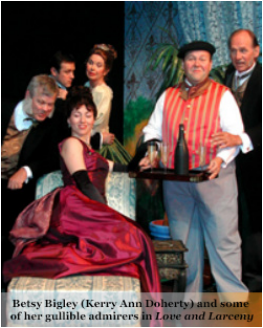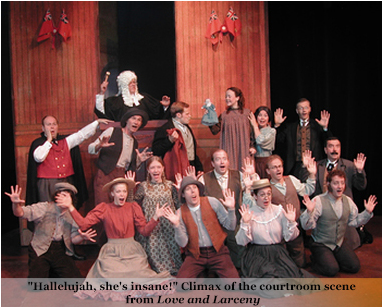Love & Larceny

Book and Lyrics by Douglas Bowie
Music and Lyrics by David Archibald
Musical. 11m, 6f (some flexibility with doubling). 2 acts.
An "almost true" musical, Love & Larceny is the larger-than-life saga of Betsy Bigley, a simple Ontario farm girl, born in 1857, who became one of the most successful con artists of her age. The "seductive swindler", she used brains, beauty and sheer nerve to separate rich men from their money all the way from small-town Ontario to Wall Street.
Betsy's story has already been treated on screen in the Gemini-award-winning movie Love and Larceny and a sequel, Grand Larceny (both written by Douglas Bowie). Love & Larceny - The Musical is not merely an adaptation of the movies, but a full re-imagining of the story for the stage. Betsy was nothing if not a great actress, and her colorful, theatrical saga is ideally suited to a musical. It's a rollicking adventure, a caper, a romance. Betsy's unlikely journey from the farm fields of Oxford County to the boardrooms of Manhattan, her many schemes and dreams, lend themselves to a variety of musical modes -- from yearning ballads to patter songs to foot-stomping hoe-downs. While a "true" story, the "facts" of Betsy's life are hopelessly intermingled with rumour, gossip and legend, and this ingenious and lively caper, inspired as much by the legend of Betsy Bigley as the life, shines a musical spotlight on one of our most notorious and compelling characters.
"Gotta Love It! ... An entertaining Canadian concoction, Love & Larceny is simply sensational" ~ Ottawa Sun
"A singing, dancing delight ... Bowie's excellent writing combines flawlessly with fun and often poignant songs ... an excellent piece of theatre, a topnotch production, one of the best the Playhouse has produced in years." ~ Gananoque Reporter
"Unforgettable ... a ripping, gripping tale ... a toe-tapping jewel of a musical." ~ Brockville Recorder & Times
Music and Lyrics by David Archibald
Musical. 11m, 6f (some flexibility with doubling). 2 acts.
An "almost true" musical, Love & Larceny is the larger-than-life saga of Betsy Bigley, a simple Ontario farm girl, born in 1857, who became one of the most successful con artists of her age. The "seductive swindler", she used brains, beauty and sheer nerve to separate rich men from their money all the way from small-town Ontario to Wall Street.
Betsy's story has already been treated on screen in the Gemini-award-winning movie Love and Larceny and a sequel, Grand Larceny (both written by Douglas Bowie). Love & Larceny - The Musical is not merely an adaptation of the movies, but a full re-imagining of the story for the stage. Betsy was nothing if not a great actress, and her colorful, theatrical saga is ideally suited to a musical. It's a rollicking adventure, a caper, a romance. Betsy's unlikely journey from the farm fields of Oxford County to the boardrooms of Manhattan, her many schemes and dreams, lend themselves to a variety of musical modes -- from yearning ballads to patter songs to foot-stomping hoe-downs. While a "true" story, the "facts" of Betsy's life are hopelessly intermingled with rumour, gossip and legend, and this ingenious and lively caper, inspired as much by the legend of Betsy Bigley as the life, shines a musical spotlight on one of our most notorious and compelling characters.
"Gotta Love It! ... An entertaining Canadian concoction, Love & Larceny is simply sensational" ~ Ottawa Sun
"A singing, dancing delight ... Bowie's excellent writing combines flawlessly with fun and often poignant songs ... an excellent piece of theatre, a topnotch production, one of the best the Playhouse has produced in years." ~ Gananoque Reporter
"Unforgettable ... a ripping, gripping tale ... a toe-tapping jewel of a musical." ~ Brockville Recorder & Times
Production History
Premiere Production
Thousand Islands Playhouse
July 28 - August 28, 2004
Directed by Greg Wanless; Sets by Kathrine Christensen; Costumes by Dennis Horn
Featuring Kerry Ann Doherty, Greg Campbell, Matthew Gibson, Rob Torr, Timm Hughes, Ramona Gilmour-Darling, Diane Stapley.
Thousand Islands Playhouse
July 28 - August 28, 2004
Directed by Greg Wanless; Sets by Kathrine Christensen; Costumes by Dennis Horn
Featuring Kerry Ann Doherty, Greg Campbell, Matthew Gibson, Rob Torr, Timm Hughes, Ramona Gilmour-Darling, Diane Stapley.
Author's Notes

The Real Betsy Bigley
It was December, 1904, when the story broke. Headlines blared --
"Did Mystery Woman Swindle Millions?"
"I Do Not Know the Woman, Says Andrew Carnegie"
"All Lies, Declares Mrs. Chadwick"
And who was all this fuss about? Betsy Bigley. An uneducated farm girl, born in 1857 into an "honest, God-fearing family" near Woodstock, Ontario -- who went on to become one of the most notorious con artists of her age. For 25 years, using a clutch of false identities, tall stories, and sheer nerve, Betsy swindled and sweet talked her way around Ontario, Ohio, and New York, coolly conning millions from prominent bankers and financiers.
Playwrights always look for great characters, and Betsy's larger than life personality and extravagant exploits cry out for theatrical treatment. She was all the more unique, because hers was an era when women were expected to tend to home, hearth and husband -- period. It was unthinkable that a mere "weaker vessel" could outsmart financial bigwigs at their own game. "I had absolute faith," said one of the duped bankers. "She was a woman."
Betsy understood the mores, the hypocrisies of her age and played them to the hilt. A Toronto Star editorial actually chastized her for using the "insidious arts of woman" to take advantage of her victims' "chivalrous impulses". While Susan B. Anthony was leading the battle for women's suffrage, one could almost say that Betsy, in her own devious way, was doing her bit for women's lib as well.
But is her tale "almost true?" Well, yes -- and no. The overall story, and many episodes in the play -- the Woodstock trial, the exploits of Madame de Vere, the Carnegie scam, the bundle of fake securities -- are firmly based on fact. But Betsy was a con artist, and plied her trade under a veil of secrecy and phoney identities. She was also a compulsive spinner of fanciful tales, so the "facts" of her life are hopelessly intermingled with rumour, gossip and legend, which she blithely fostered herself. Love and Larceny is inspired as much by the legend as the life.
While it's very much a period piece, there are modern resonances in Betsy's story. Is the idea of a woman having to resort to charm, guile and sex appeal to make it in a man's world really out of date? As well, in this post-Enron age, the notion of fat cats who are only too willing to bend the rules, blink an eye, and buy into dubious schemes to get even fatter, has a distinctly modern ring to it. As Betsy says, "Everybody Does It."
Unlike Americans, Canadians are not particularly adept at mythologizing our past. If Betsy had been American, she might well be as famous as Annie Oakley or Bonnie and Clyde. She was cunning and daring, extravagant and flamboyant, even a little ruthless when necessary -- all traits which seem, well, American. But she was Canadian. At a time when we constantly hear of the growing cultural and economic domination of Canada by the U.S., the saga of an Ontario farm girl who hitched her wagon to a a crooked star, and beat Americans at their own game, should warm the hearts of Canadian nationalists everywhere.
It was December, 1904, when the story broke. Headlines blared --
"Did Mystery Woman Swindle Millions?"
"I Do Not Know the Woman, Says Andrew Carnegie"
"All Lies, Declares Mrs. Chadwick"
And who was all this fuss about? Betsy Bigley. An uneducated farm girl, born in 1857 into an "honest, God-fearing family" near Woodstock, Ontario -- who went on to become one of the most notorious con artists of her age. For 25 years, using a clutch of false identities, tall stories, and sheer nerve, Betsy swindled and sweet talked her way around Ontario, Ohio, and New York, coolly conning millions from prominent bankers and financiers.
Playwrights always look for great characters, and Betsy's larger than life personality and extravagant exploits cry out for theatrical treatment. She was all the more unique, because hers was an era when women were expected to tend to home, hearth and husband -- period. It was unthinkable that a mere "weaker vessel" could outsmart financial bigwigs at their own game. "I had absolute faith," said one of the duped bankers. "She was a woman."
Betsy understood the mores, the hypocrisies of her age and played them to the hilt. A Toronto Star editorial actually chastized her for using the "insidious arts of woman" to take advantage of her victims' "chivalrous impulses". While Susan B. Anthony was leading the battle for women's suffrage, one could almost say that Betsy, in her own devious way, was doing her bit for women's lib as well.
But is her tale "almost true?" Well, yes -- and no. The overall story, and many episodes in the play -- the Woodstock trial, the exploits of Madame de Vere, the Carnegie scam, the bundle of fake securities -- are firmly based on fact. But Betsy was a con artist, and plied her trade under a veil of secrecy and phoney identities. She was also a compulsive spinner of fanciful tales, so the "facts" of her life are hopelessly intermingled with rumour, gossip and legend, which she blithely fostered herself. Love and Larceny is inspired as much by the legend as the life.
While it's very much a period piece, there are modern resonances in Betsy's story. Is the idea of a woman having to resort to charm, guile and sex appeal to make it in a man's world really out of date? As well, in this post-Enron age, the notion of fat cats who are only too willing to bend the rules, blink an eye, and buy into dubious schemes to get even fatter, has a distinctly modern ring to it. As Betsy says, "Everybody Does It."
Unlike Americans, Canadians are not particularly adept at mythologizing our past. If Betsy had been American, she might well be as famous as Annie Oakley or Bonnie and Clyde. She was cunning and daring, extravagant and flamboyant, even a little ruthless when necessary -- all traits which seem, well, American. But she was Canadian. At a time when we constantly hear of the growing cultural and economic domination of Canada by the U.S., the saga of an Ontario farm girl who hitched her wagon to a a crooked star, and beat Americans at their own game, should warm the hearts of Canadian nationalists everywhere.
